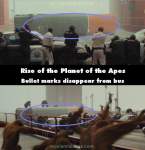
Continuity mistake: In the scene on the Golden Gate Bridge when the apes are pushing the bus, the police shoot the bus numerous times, but when the camera goes off the bus and then shows the bus again (twice) the bullet holes are not there anymore.

Directed by: Rupert Wyatt
Starring: James Franco, Andy Serkis, Tom Felton, Freida Pinto

Continuity mistake: In the scene on the Golden Gate Bridge when the apes are pushing the bus, the police shoot the bus numerous times, but when the camera goes off the bus and then shows the bus again (twice) the bullet holes are not there anymore.
Continuity mistake: When Will tosses the envelope with money on the table, it moves away/closer to the stack of papers, depending on the angle.
Revealing mistake: When the apes jump out of the lab windows out to the street, they don't cast a shadow on any of the glass except the ones on the ground floor.
Trivia: Don't leave when the credits roll. There is a scary snippet you don't want to miss.
Trivia: Bright Eyes is what they called Caesar's mom in this movie. This was also the name given to Charlton Heston by Dr. Zira in the original movie Planet of the Apes (another tribute to the old film).
Trivia: In the end of the old Planet of the Apes movie, we see remains of the Statue of Liberty. In this movie, we see Caesar assemble the Liberty statue (some kind of a puzzle).
Steven Jacobs: You used an untested drug on your father. I could end your career with one phone call.
Will Rodman: Let me save you the trouble. I quit.
Dodge Landon: Get your stinking paws off me you damn dirty ape!
Maurice: Hurt bad?
Caesar: You know signs?
Maurice: Circus orangutan. Careful humans don't like smart ape.
Question: Did they give John Lithgow's character Alzheimer's disease in remembrance of Charlton Heston?
Question: I'm no expert on apes so can someone tell me if the conversation in sign language that Caesar has with the orangutan is possible? We know that apes can be taught to sign and hereby communicate basic concepts and identify objects. But the orangutan, which has not had the benefit at this point in the film of the mind altering drug, communicates that humans do not like smart apes and, by extension, it has kept its ability to sign secret. This is complex behaviour that requires the ape to understand human motivations and decide to deceive its captors. Is this possible?
Answer: It's not necessarily a sign that the orangutan understands human motivations. It could be, and probably more likely *is*, a sign that the ape has shown its intelligence previously during its stay in the habitat, was abused by the humans as a direct or indirect result, and was subsequently conditioned to play dumb.
Question: Why didn't the ape-keeper, Rodney, simply shoot Caesar? He was in the sniping platform, he was aiming the tranquilizer rifle, he had a clear shot, but he just lowered his rifle and fled when Caesar yelled "No!" for the first time. If Rodney had pulled the trigger, the ape rebellion would have been nipped in the bud.
Chosen answer: Rodney was against the cruelty that fellow ape-keeper Dodge displays toward the apes and was likely hesitant to shoot Caeser at first. When Caesar yelled "No!", Rodney lowered his rifle from shock. Caesar then starts running around chanting "No!", and because he's running around Rodney no longer has a clear shot, and then he panics and flees having just seen an ape speak.
Separate from membership, this is to get updates about mistakes in recent releases. Addresses are not passed on to any third party, and are used solely for direct communication from this site. You can unsubscribe at any time.
Check out the mistake & trivia books, on Kindle and in paperback.
Chosen answer: No they most certainly did not. That wouldn't remotely be considered a particularly respectful homage! They picked Alzheimers because it's specifically a brain condition, which can then be explored in the movie as a plausible way of explaining the intelligence raising properties of the drug used.
GalahadFairlight